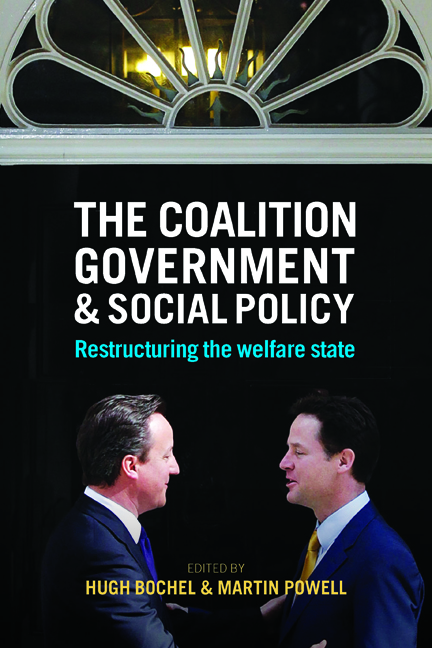Book contents
- Frontmatter
- Contents
- Notes on contributors
- One The transformation of the welfare state? The Conservative–Liberal Democrat coalition government and social policy
- Two The coalition government, public spending and social policy
- Three The changing governance of social policy
- Four The coalition, social policy and public opinion
- Five Health policy and the coalition government
- Six The coalition government, the general election and the policy ratchet in education: a reflection on the ‘ghosts’ of policy past, present and yet to come
- Seven Coalition housing policy in England
- Eight Social security under the coalition and Conservatives: shredding the system for people of working age; privileging pensioners
- Nine Welfare and active labour market policies in the UK: the coalition government approach
- Ten ‘It ain’t what you do, it’s the way that you do it’: adult social care under the coalition
- Eleven Family policy: the Mods and Rockers
- Twelve One step forward, two steps back: children, young people and the Conservative–Liberal Democrat coalition
- Thirteen The coalition and criminal justice
- Fourteen Equalities: the impact of welfare reform and austerity by gender, disability and age
- Fifteen Social policy, the devolved administrations and the UK coalition government
- Sixteen Conclusions
- Index
Twelve - One step forward, two steps back: children, young people and the Conservative–Liberal Democrat coalition
Published online by Cambridge University Press: 01 September 2022
- Frontmatter
- Contents
- Notes on contributors
- One The transformation of the welfare state? The Conservative–Liberal Democrat coalition government and social policy
- Two The coalition government, public spending and social policy
- Three The changing governance of social policy
- Four The coalition, social policy and public opinion
- Five Health policy and the coalition government
- Six The coalition government, the general election and the policy ratchet in education: a reflection on the ‘ghosts’ of policy past, present and yet to come
- Seven Coalition housing policy in England
- Eight Social security under the coalition and Conservatives: shredding the system for people of working age; privileging pensioners
- Nine Welfare and active labour market policies in the UK: the coalition government approach
- Ten ‘It ain’t what you do, it’s the way that you do it’: adult social care under the coalition
- Eleven Family policy: the Mods and Rockers
- Twelve One step forward, two steps back: children, young people and the Conservative–Liberal Democrat coalition
- Thirteen The coalition and criminal justice
- Fourteen Equalities: the impact of welfare reform and austerity by gender, disability and age
- Fifteen Social policy, the devolved administrations and the UK coalition government
- Sixteen Conclusions
- Index
Summary
Introduction
After 13 years of Third Way reforms under Labour, the formation of the Conservative–Liberal Democrat coalition government in 2010 signalled change, continuity and uncertainty. The coalition's Programme for government (Cabinet Office, 2010) espoused a firm commitment to the Conservatives’ deficit reduction plan and neoliberal welfare state reforms. However, the coalition also pledged to work towards the 2020 child poverty targets that Labour had established. There were also plans to introduce child and youth reforms that took forward the coalition parties’ shared policy goals and constituted dimensions of change and continuity in childcare, early intervention, education, public health, parenting and family services, and work–family policies. However, there remained much scope for conflict between the coalition partners. Prior to the 2010 election, the Liberal Democrats had called for more extensive investment and reform in welfare state support and services for children, youth, parents and families (Marshall and Laws, 2004). The Conservatives’ agenda, in contrast, sought reduced and rationalised welfare state support (Conservative Party, 2010). Moreover, many child-centred and youth-focused Conservative policies were framed in terms of their ‘Broken Britain’ campaign, which emphasised ‘five main pathways to poverty’ – ‘welfare dependency, educational failure, family breakdown, severe debt and poor health’ (CSJ, 2006, p 2; see also Conservative Party, 2010). While justifying public expenditure cutbacks and pro-market welfare state reforms, this agenda also incorporated increasing interest among Conservatives in early childhood and parenting and family interventions and services (CSJ, 2006). The coalition's Programme for government primarily promoted Conservative agendas in these areas (Cabinet Office, 2010), but the Liberal Democrats were influential in shaping subsequent policy developments.
To review the coalition years, this chapter initially situates this period within a broader context of prior developments and debates. It then examines the coalition government's initial programme and subsequent policy developments. The analysis highlights three aspects of policy change and reform: reductions in cash support for children, young people and families; the reframing of child poverty in terms of the Conservatives’ ‘five pathways to poverty’ thesis, the Liberal Democrats’ social mobility agenda and early intervention developments; and child protection and children's social care reforms. The analysis highlights change and continuity, conflicts and contradictions, in social policies for children and young people during the coalition period.
- Type
- Chapter
- Information
- The Coalition Government and Social PolicyRestructuring the Welfare State, pp. 265 - 284Publisher: Bristol University PressPrint publication year: 2016



